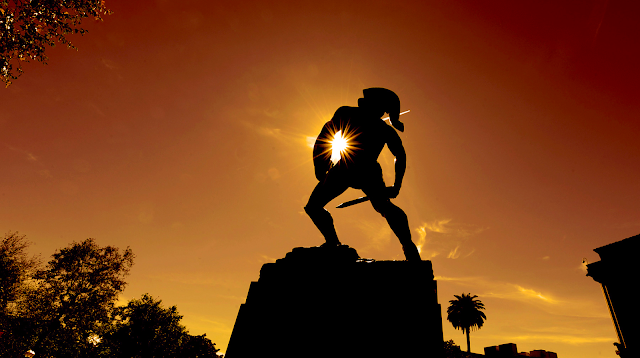Given that I was a finance major in college, most of the math and science I rely on to write Astronomical Returns hearkens back to my high school days. However, today's post wasn't inspired by AP Calculus or AP Chemistry, but AP English, believe it or not! Let me explain:
When I moved from New York to Los Angeles to start working for SpaceX, I made a conscious effort to mentally prepare myself for the isolation I'd initially experience, moving to a new city and leaving all my friends behind; 5 months of COVID-induced quarantine has only made things harder. And while I've largely adjusted to the new norm and am enjoying SoCal, the extra time I've spent alone has given me more opportunity to ponder a crucial challenge future Mars-bound astronauts will have to endure: the detrimental effects of long-term isolation. It's well known that NASA closely monitors the mental health of astronauts currently performing long-duration spaceflights on the ISS. In fact, given their intensive training and unique off-world experiences, several active and former astronauts shared their best advice to help the world cope with the emotional strain of social distancing. The most insightful piece was done by Scott Kelly, who completed his famous year in space in 2016 (read his article here)
"Do not go where the path may lead, go instead where there is no path and leave a trail"
 |
| Scott Kelly inside a Soyuz simulator at the Gagarin Cosmonaut Training Center in Star City, Russia | Credit: NYT |
And yet, as much as I love space, for me what's come to mind in recent days is an essay I read by the American transcendentalist author Ralph Waldo Emerson, 7 years ago for high school English. Written in 1841 and titled Self-Reliance, the paper discusses at length the importance of individualism, introspection, nonconformity, and personal fortitude - themes I found strikingly relevant both for a quarantine and an interplanetary journey. You see, although loneliness seems like an innocuous problem compared to hazards like ballistics and radiation, astronauts have openly talked about their struggles enduring long spaceflights. As Canadian astronaut David Saint-Jacques described from on board the ISS, "The problem you develop here is that everything is a little bit the same every day. It can be depressing sometimes if you're not careful" (sounds like our collective present predicament, no?) And this negative emotion translates to more than just melancholy: research shows the combination of microgravity, radiation, and isolation degrades the gray matter in astronauts' brains much faster than any normal aging
"The voyage of the best ship is a zigzag line of a hundred tacks"
 |
| "You're very, very far away from the people you love on Earth, and that can make you sad" |
But curiously, the isolation of spaceflight is likely the sort of environment that Emerson and his contemporary transcendentalist writers would've advocated for. They believed modern society distracts the individual from his inherent potential and corrupts his innate purity. Instead, people are at their best when they're alone, so they can discover their inner purpose. To this end, the American transcendentalists of the mid-19th century spent much time purposefully isolated in nature. Emerson often ventured in the wilderness of upstate New York, and his disciple Henry David Thoreau famously spent two years living alone in a hut by Walden Pond in Massachusetts, immersed in his thoughts and writing his most influential works
"What lies behind us and what lies before us are tiny matters compared to what lies within us"
 |
| A still image of Walden Pond, where Thoreau wrote his famous exploration of individualism and self-sufficiency |
Thoreau's mark of two years in solitude is particularly poignant for spaceflight, as two years is the length of a round trip mission to Mars. I've wondered whether the personality characteristics NASA is looking for in its astronaut candidates will shift as we set our sights back on the Moon and Mars. Perhaps in addition to the usual traits like teamwork and leadership, NASA may start to give preference to introversion and detachment? Undoubtedly, astronauts won't fare very well on a trip to the Red Planet if they get too homesick for their friends and family; not even Zoom or FaceTime will save them, as the time delay of being millions of miles away will make live communication impossible. If it's any indication, Thoreau never married or had children - perhaps the ideal crew for a mission to Mars is a spaceship full of cheerful, single, workaholic loners!
"The only person you are destined to become is the person you decide to be"
 |
| Astronaut Anne McClain's list of 5 essential behaviors for living in confined spaces: communication, leadership, self-care, team care, cooperation |
Sometimes I let myself imagine how I'd perform as the commander of the first mission to Mars, but of course I'm fully aware of my myriad of disqualifying factors. My glaring lack of a STEM degree or piloting/military experience aside, though from a psychological perspective I'd probably do fine in characteristics like leadership and likability, I'm pretty sure my extroverted personality would be my Achilles heel. Other people I've observed are much better at isolation - they're perfectly content working in their rooms by themselves for hours on end, and they seem less bothered by activities like repeatedly eating meals alone. As for me, well, let's just say I have no intention of spending two years in solitude by a pond with nothing but my thoughts and my journal. When the first human steps on Mars, I plan on being surrounded by tons of people, celebrating like a madman!
"You become what you think about all day long"
 |
| "I'm the first person to be alone on an entire planet" - Mark Watney, The Martian |




No comments